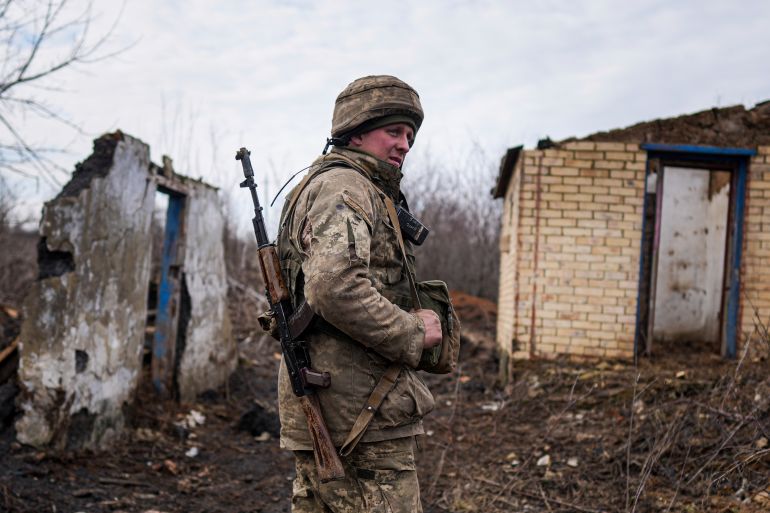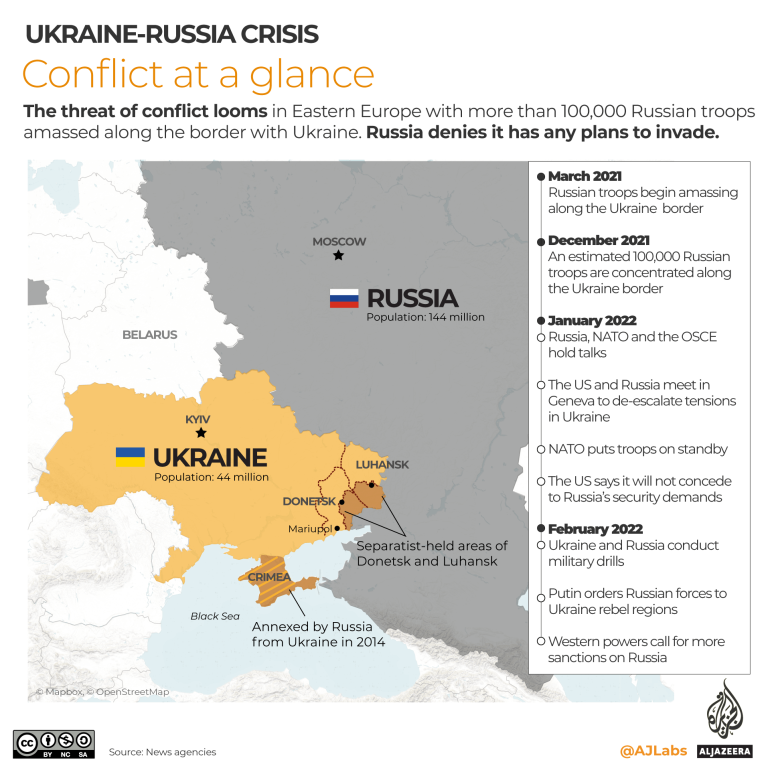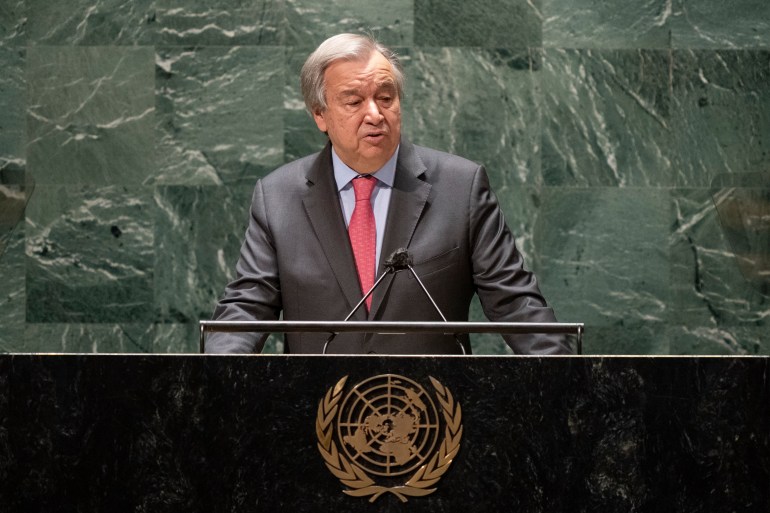Ukraine imposes state of emergency, summons citizens home
Ukrainian government announces compulsory military service for all men of fighting age as Moscow evacuates Kyiv embassy.

Ukraine has imposed a state of emergency and told its citizens in Russia to leave immediately, as Moscow began evacuating its Kyiv embassy in the latest ominous signs of an all-out Russian military onslaught.
Shelling intensified on Wednesday at the line of contact in eastern Ukraine, where Russian President Vladimir Putin recognised the independence of two Moscow-backed rebel regions this week and where he has ordered the deployment of Russian troops as “peacekeepers”.
Keep reading
list of 4 itemsWhat sanctions have been imposed on Russia?
‘Mariupol won’t give up’: Ukrainians defy Russian invasion threat
Russian billionaires see wealth tumble as tensions escalate
But there was still no clear indication of whether he plans to follow that up with a massed assault on Ukraine involving the tens of thousands of troops he has gathered near his neighbour’s borders.
“Predicting what might be the next step of Russia, the separatists or the personal decisions of the Russian president – I cannot say,” Ukraine’s President Volodymyr Zelenskyy said.
Later on Wednesday, Ukraine’s parliament overwhelmingly approved Zelenskyy’s decree that imposes a state of emergency for 30 days starting Thursday. The state of emergency allows authorities to impose restrictions on movement, block rallies and ban political parties and organizations “in the interests of national security and public order.”
The Ukrainian government has also announced compulsory military service for all men of fighting age.
Ukrainian government and state websites, which have experienced outages in recent weeks blamed by Kyiv on cyberattacks, were again offline on Wednesday. Ukraine’s parliament, cabinet and foreign ministry websites were affected.
Moscow denies planning an invasion and has described warnings as anti-Russian hysteria. But it has taken no steps to withdraw the troops deployed along Ukraine’s frontiers.
On Wednesday, Russia took down flags from its embassy in Kyiv, having ordered its diplomats to evacuate for safety reasons.
Sanctions
The United States has described Russia’s actions as the start of an “invasion”, but along with allies has so far unveiled mostly incremental sanctions, while making clear they were keeping tougher measures in reserve in case of a full-scale invasion.
As part of an initial tranche of sanctions, President Joe Biden said the US would impose sanctions on the company building Russia’s Nord Stream 2 gas pipeline.
European Union sanctions approved on Wednesday will add all members of Russia’s lower house of parliament who voted to recognise the separatist regions in Ukraine to a blacklist, freezing their assets and banning travel.
EU leaders were due to hold an emergency summit later on Thursday to discuss next steps.
The United Kingdom announced new restrictions banning Russia from the issuing of new bonds in its security markets, and called for its broadcasting regulator to investigate Russia’s RT international television news channel as a propaganda outlet.
“There will be even more tough sanctions on key oligarchs, on key organisations in Russia, limiting Russia’s access to the financial markets, if there is a full-scale invasion of Ukraine,” UK Foreign Secretary Liz Truss said.
The steps follow measures announced on Tuesday, including freezing the approval of a new Russian gas pipeline by Germany, and imposing new US sanctions on Russian banks.
But none of the measures announced so far directly targets Putin himself, or is expected to have serious medium-term consequences for Moscow, which is sitting on more than $630bn in international reserves. The rouble fell, but not by much.
Western countries have been warning for weeks about the possibility of the bloodiest war in Europe for decades. That has not materialised but the apparent threat remains, leaving policymakers to struggle with calibrating their responses.

UN warns of dire global impact
A United Nations meeting on Ukraine on Wednesday heard that a full-scale Russian invasion of the country would have a devastating global impact that would likely spark a new “refugee crisis”.
The US said a war could displace up to five million people while Ukraine’s foreign minister said such a conflict would mark “the end of the world order as we know it”.
The dire warnings were made during a UN General Assembly session on “temporarily occupied Ukrainian territories” that has been held at UN headquarters in New York every year since Russia annexed Crimea in 2014.
UN Secretary-General Antonio Guterres warned the body that “our world is facing a moment of peril” over the crisis.
“If the conflict in Ukraine expands, the world could see a scale and severity of need unseen for many years,” he said.
“It is time for restraint, reason and de-escalation,” Guterres added, stressing there was no room for actions or statements that would “take this dangerous situation over the abyss”.

Fresh troops deployed
Ukraine’s military said one soldier had been killed and six wounded in increased shelling by pro-Russian separatists using heavy artillery, mortar bombs and Grad rocket systems in the two breakaway areas over the previous 24 hours.
New satellite imagery showed several fresh troop and equipment deployments in western Russia and more than 100 vehicles at a small airfield in southern Belarus, which borders Ukraine, according to US firm Maxar.
For months, Russia has presented the crisis mainly as a dispute with the West, demanding security guarantees, including a promise never to allow Ukraine to join NATO.
But the recognition of the separatist regions was accompanied by much stronger language against Ukraine, including personally from Putin.
In a TV address on Monday, Putin rambled across centuries of history to characterise the Ukrainian state as an artificial construct wrongly carved out of Russia by its enemies.
Some who saw the speech said they now feel menaced by a leader making decisions that no longer appear rational.
“In the case of Putin, this is not a struggle for money or power: It’s about pride, which means the mind is switched off. He can’t stop, and he can’t be stopped,” said Lilia, 72, a pensioner in the Kyiv suburb of Brovary.
German Foreign Minister Annalena Baerbock said Russia was heading down a path that would make it a global pariah, and urged it not to “completely isolate yourself worldwide”.
Diplomacy has now faltered. US Secretary of State Antony Blinken and French Foreign Minister Jean-Yves Le Drian cancelled separate meetings with Russian Foreign Minister Sergey Lavrov.
A summit between US President Joe Biden and Putin, floated by France at the start of the week, now seems unlikely.
Putin said he was always open to finding diplomatic solutions but that “the interests of Russia and the security of our citizens are unconditional for us”.